My guest today found success in marketing campaigns through a combination of positive intent, a unique approach, and synchronicity. When Jabez LeBret wanted to find donors to fund the tuition-free boarding school he and his wife founded, he decided to create a podcast to attract a rare set of wealthy, high-profile guests, who would become potential donors, and they would talk about struggles and near misses along the way to success. Jabez is a seasoned marketer who sold his award-winning agency in 2018 to pursue making an impact in K12 education.
In this episode, we break down that concept of going after an audience of one—the personal touches and original thinking that attracts talent to a podcast or a meeting and building FOMO or fear of missing out, as a way of creating interest around an offering. Jabez shares his strategy for inviting guests to a podcast and also discusses some of the marketing techniques he’s perfected. He is a man with a mission who has managed to achieve some amazing things, and he’s an inspiration for anyone interested in being a domino in the chain of making a difference. So, without any further ado, on with the show!
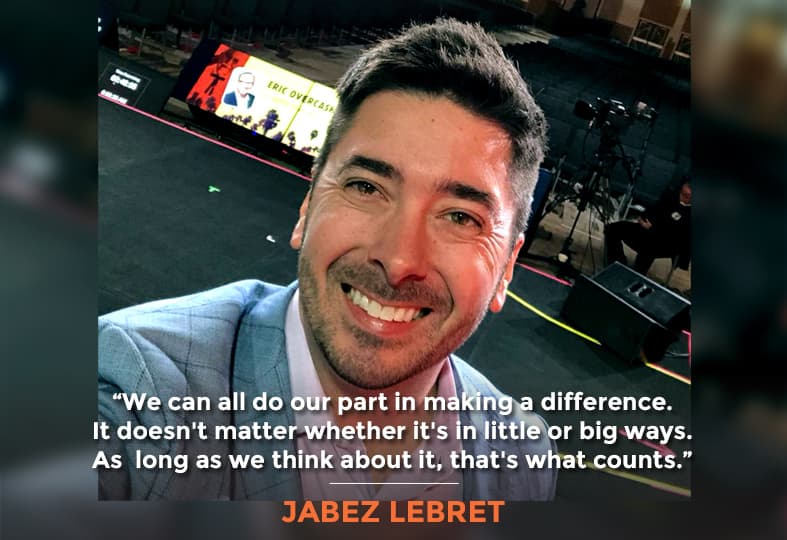
In this Episode
- [00:29] – Stephan introduces Jabez LeBret, a seasoned marketer who sold his award-winning agency in 2018 to make an impact on K12 education.
- [05:35] – Jabez tells us why he came up with the idea of creating a podcast to interview ultra-wealthy people.
- [11:20] – Jabez talks about the outcome of him inviting billionaires for an interview on his podcast show.
- [16:53] – Stephan points out how social proof is very valuable in inviting guests to a podcast.
- [22:48] – Stephan and Jabez give out points on making a potential guest become comfortable and say yes to an interview with you.
- [26:59] – What is Contribution Networking, and how is it done?
- [31:17] – What are the advantages of doing an in-person meeting instead of doing it virtually?
- [37:59] – Stephan and Jabez express their feelings when they toured Zappos’ headquarters and how it reflected their organization’s mindset and soul.
- [44:14] – Jabez and Stephan share their perspective of having the right intent when building a strong network.
- [51:07] – Visit Jabez LeBret’s website JabezLeBret.com to be inspired and learn more from him.
Transcript
I love that you are making a difference in the world. I love people who make a difference in the world. So welcome to the show, Jabez.
Thank you for having me. It’s a real honor. I agree. I think we can all do our part to make a difference in little ways and big ways. As long as we’re thinking about it, I think it matters.
Aim higher; you’ll do better.
I always say, “Aim higher; you’ll do better.” I learned that from a negotiating course I took in like 1995. I think it’s good advice.
Absolutely. Because you never really stopped growing. As long as you’re aiming high enough, you just will continue to strive for bigger and greater things, which is fantastic.
As Tony Robbins says, “You’re either growing, or you’re dying.” So I choose the former.
Absolutely.
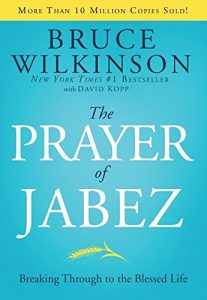
One thing I have to say before we get into the meat of the episode is I love your name. It’s really cool and exotic. And there’s a story behind your first name Jabez like it’s a story from the Bible. There’s an actual book called The Prayer of Jabez by Bruce Wilkinson. He’s sold like 10 million copies.
I’m so upset I didn’t write that book. I should have been the one who wrote that book. “The Prayer of Jabez, by Jabez.” It was a super famous book. Interestingly, no one had really heard of my name until that book came out. It is an old Hebrew name. It’s out of the Old Testament, back in Chronicles. And people ask me often what the name means. It means born in a time of great sorrow. I think that’s not an easy meaning to a name. Sometimes it doesn’t mean sunshine, and it doesn’t mean god of something. It doesn’t mean anything like that. But my family was going through a really tough time when I was born. So the name was fitting, and it’s interesting. I also get asked a lot like, “Well, what are you?” Like, the name Jabez LeBret, they’re like, “What does that even mean?” And I’m like, “Well, the first name is Hebrew, the last name is French, I’m half Italian. It’s one big identity crisis. I don’t really know. But it served me well. So I’ve been very blessed.”
That’s cool. Did you read the book, The Prayer of Jabez?
I have. I think that anytime you have a name, like Jabez and a book comes out with your name on it, and you have to read that book. There is no option.
What’s like a big takeaway that you got from that book?
What’s interesting about the book is it really focuses on a growth mindset. If you want to get into a business term because my name appears in basically two verses. The first verse talks about being born in great sorrow. The second verse talks about abundance. And the book focused on the abundance part, which is good. And I think that’s important. It’s also important to acknowledge that there is a struggle in the world. And it is difficult in the world for some people out there to get a level footing and to be able to get on their way. While the abundance is great, let’s not forget that sometimes we need to make sure that there’s some equity and that people are given the opportunity to be able to go take advantage of the abundance just like the rest of us I’m a six-foot-tall, white male. Things haven’t been that difficult for me here in the US. But I definitely can acknowledge that the book has a good angle, no question about it, but let’s not forget about the former.
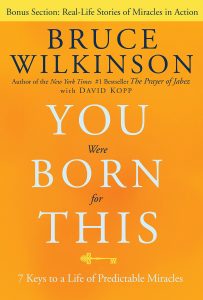
Great point. I’m reading his book, You Were Born for This, right now. Bruce Wilkinson came out with a book about how to deliver everyday miracles. Like you’re just a delivery person for the Creator. I just love this book so far. It’s amazing. So check it out.
All right. I’ll take a look. Thank you. I am always looking for new recommendations. Although I’m looking over my bookshelf right now, and there are probably 16 books that I’m trying to get to.
I hear you. I know what that’s like. Okay, let’s talk about some of the cool marketing stuff that you’re up to these days and how this might relate to our listeners because I really liked the angle that you came to me with. Like, “Let’s do an episode on this.” Why don’t you encapsulate in a few sentences what that pitch is like.
As an agency owner, and you’ll completely relate to this. We spent a lot of time doing B2B marketing because we own an agency that worked with companies. We did a lot of B2C and B2B marketing for our clients. A huge focus of ours was audience building and getting our name out there, and making sure that we were well branded and well positioned and had a good following, and we were found on search, and we were doing all these things to try to be big. To try to be everywhere.
Yeah, increase reach and expand, scale, all that.
How many clicks? How many likes? How many shares? Scale, scale, scale, and we become just obsessed with this for your clients and for your business. I embarked on a new project, my wife and I opened up a tuition-free all-girls boarding high school for underserved youth in San Diego. At the beginning of that project, we started as a nonprofit, and we had to go raise money. I was like, “Okay, well, I gotta go raise money. I need to raise a little over a million bucks to get this thing off the ground.” And, “I’m not that wealthy, so how am I going to do this? I need to find people who are wealthy enough to do this thing and would be willing to give money to a cause.” And I was like, “How do you get meetings with billionaires?” Like, “What do you do that could get you in the same room and have dedicated one-on-one time with these ultra-wealthy people?” Because that was kind of my target for my philanthropy.
We can all do our part in making a difference. It doesn't matter whether it's in little or big ways. As long as we think about it, that's what counts. Share on XI also thought about influencers within the industry that I’m in. How do I get in front of those influencers? And I didn’t come from education. So it was like a clean slate. I thought, “Alright, I’m gonna create a podcast. And that podcast has one sole purpose, to get me the meeting with the person. I don’t care if anybody listens to any of my episodes at all. I’m going to create a podcast that simply opens the door, to get me to have a 45-minute audience with someone who would barely give somebody five minutes because they’re that busy.” It made me think about all the times that I have actually gone out of my way to produce content for one. It is producing content for one person, and not producing content campaigns for the world. But content campaigns that are super laser-focused for one individual. And it was just a different mind shift for me.
It’s brilliant. It really is. And I’ve rarely heard this kind of mindset shift from anybody. I think the only person I can think of right now is Dennis Yu. He is the only person I can think of who is taking this kind of approach, but it’s not for podcasting. It’s for Facebook advertising. Like creating an audience of one essentially, of who you’re targeting with Facebook ads. And those Facebook ads are so laser-focused that it’s kind of spooky, and they’re effective. I just think that’s brilliant. But this is other level stuff because now we’re talking about not just an ad, but an entire campaign and entire podcast. Are we talking just an episode, or are we talking about the entire show?

No, I did dozens and dozens of episodes. Every single one of them was an interview with one person that I wanted to meet with. The whole entire outcome was basically to close them in as a client. It’s the same thing, right? In the nonprofit world, they’re called “donors.” In the for-profit world, they’re called “customers.” Either way, you’re asking for people to give you their money in exchange for something. When I started approaching, I said, “Okay, well, I’m going to need to have some branding around it.” And so, I had this URL that I’ve been sitting on forever as a joke. It was called 26.1, and a marathon is 26.2 miles. So it’s a play on getting all the way to that last 10th of a mile and then not making it. And it was kind of spawned from those bumper stickers that you see on people’s cars, the oval ones that are white, that says “26.2.” And I was gonna make bumper stickers that said, “26.1” like, “Almost got there, but didn’t quite make it.” And the branding around the podcast was moments in your life where you almost were successful, but you didn’t quite reach the success, and why? What did you learn? How did that grow? How can we teach the younger generation? Because I have to think about what I’m trying to accomplish; opening a school, I want the content to be about helping younger kids. When I would reach out to these people, I would say, “Here’s what I’m doing. I’m creating a podcast, and I’d like to interview you about your successes and the times you didn’t succeed. And I want to take that knowledge. And I want to be able to help use that as an example for students in the world.” I had a website and the whole thing like full campaign style, with just wanting to go get that one meeting at a time.
That’s so smart.
Thank you.
That is just so cool. Let’s talk about some of the results that you were able to achieve. Did you get an audience with billionaires? Did you get a big check to fund your school? What happened?
The crazy thing about it is that everybody loves to feel as though they’re a person that is to be interviewed. Whether that’s a publication in writing, I’ve done a lot of journalism work, and that’s kind of where the idea came from. When I would go approach people that I wanted to interview for Forbes or NBC, I would be somewhat using that as an excuse to get a chance to sit down and meet with a person. I mean, yes, the person is compelling and everything else. But selfishly, as a journalist, you’re like, “Yeah, this is pretty cool. I get to sit Tony Hsieh, or Rand Fishkin, like all the people that I respect and think we’re awesome. I get to go into interviewing, which is kind of fun. I hadn’t connected the full dots to thinking about it as a business endeavor, to think about it as a way to go get more clients. What I started to focus on was my hit list of who I wanted to talk to. Just like any other marketing campaign, instead of creating a persona of the type of person I wanted to talk to, I created a specific list of the actual people I wanted to talk to. I had a list of maybe like 30 people that I was like, “It’d be really awesome if I could sit down with this person.” And one of them was a gentleman, and his wife was a senior technician at AT&T and Motorola. Her husband invented the actual Motorola cell phone. They’re like a telecom duo. And they’re billionaires. And I was like, “I want to sit down with her and get an interview.” And all I did was, like, reach out with my list of people that I was going to interview. And I said, “Here’s all the people that I want to interview, and your names on that list. And if you see your name, next to people that you also respect…” Like if your name is next to Pete Nordstrom, and your name is next to Charles Koch, and your name is next to Reed Hastings, and you’re seeing these people that you would look at and say, “Oh, I want to be in that same group,” then it takes the walls down. Because the first thing people are gonna think is, “Well, maybe I’m not important enough, or cool enough, or famous enough to go sit down and approach these people.” And the reality is, you don’t have to be. You just need to put them in the pool with the people that they respect and enjoy.

That reminds me of ages ago. I did this campaign for MarketingProfs, where I recruited different thought leaders for a thought leader summit on a particular topic, and I did one on blog marketing. I did one on SEO, one on buzz marketing, one on email marketing, and I got really cool people like, for example, I got Seth Godin. And the way that I got Seth was by telling him that I already had Robert Scoble. This was way early when he was still working at Microsoft as their chief blogger. Seth was like, “Well, you got Robert, I’m in. I want to be in a conversation with Robert.” And once I had Seth, everybody else was like, “Yeah.” This was the one on blog marketing. And then I did one for I think the next one might have been on buzz marketing. And so I’m like, “Okay, who are the big names for that?” It’s like a domino effect, and if you get one, everybody else wants to join it. And that’s how I was able to start getting really dream guests pretty early on in my podcasting; it was by getting Jay Abraham on the show in the first ten episodes. And I was able to dangle that carrot and say, “Well, it’s a new podcast, but Jay Abraham has been on, and I’d love to have you on the show.” So that avoids the whole conversation of “What are your numbers? How many listeners? How many downloads?” I hate that conversation.
I agree. That conversation is angling in the wrong way. That’s not really what it is you’re hoping to accomplish. And you can lean in on some of your former relationships and experiences. So if you happen to have interviewed somebody in another environment for something, it’s okay to say, “Yeah, I’ve interviewed this person before. I’m starting a new thing. I’ve interviewed these people before.” If you’ve never interviewed anybody before for anything, then it’s okay to say, “Excuse me, here’s the list of people that I want to interview.” And then as they start to fall like somebody else says yes. When somebody says yes, they bump up to the top. And then in my email, I would say, “I’ve confirmed interviews with these three people. And these are the other 12 people that I’m currently reaching out to,” where that person’s name is in that list. And it’s exactly what you’re talking about, which is, “Hey, Scoble is already in,” and you’re like, “Oh, well, then if Scoble is in, then I want to be in it too.” And it does create kind of a fear of missing out or that wanting to be a part of that group. It really strengthens that, which is brilliant. I think that was a great technique.
It’s pretty fun. Social proof is super valuable to the point where you might even do something out of your way for free for somebody in order to get that social proof. So I had offered some different guests to do an SEO call or something.
Absolutely.
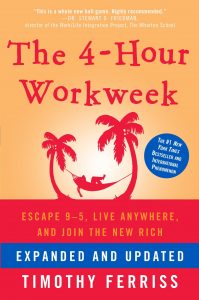
Dave Asprey, for example, I just did a little pro bono thing, and now he’s a client. He became a guest on my podcast and then on the other podcast as well, and now we’re working together. It’s really cool. Another thing that I love that you said is you can take something out of another context, like an old interview that you’ve done in the past for another thing. I did that very thing because Tim Ferriss is kind of a big deal, right? And I interviewed him many years ago, before this podcast. I had a kind of a false start. I mean, that was a kind of a half start. I did my 26.1 miles, and that was the Netconcepts Friends podcast, or whatever. And it was back in 2007 or so. And I interviewed Tim Ferriss back then, and it was great stuff. We talked about how to outsource and The 4-Hour Workweek philosophy. Really great stuff. Now he’s so broad in so many different topics. He’s a biohacker.
He’s gotten into a lot of stuff. You got him early, right?
Yeah. I got him super early. And I re-listened to it, and I’m like, “This is gold. Yeah, it’s a decade old, so what? I’m going to publish it, and I’m going to put it on this podcast as an episode with Tim Ferriss.” Because that’s still my voice interviewing him, it’s unmistakable. It’s great content. And I do preface it at the beginning in the intro by saying, “Hey, this is an old episode. I dug it out of the archives. And it’s as good today as it was back when we recorded it. So I hope you enjoy.” And I got good feedback on it, and now I get to use Tim’s name on my list of example guests. And that just eliminates any questions around your reach and download numbers and all that sort of stuff.
This works for any medium. It could be video, and it could be podcasting, it could be written, you could be writing a piece creating a white paper, it could be a social interview series, it could be TikTok. Whatever it is, I think the strategy works the same. And as you start to approach it. And interestingly, Dennis Yu, who we mentioned earlier, one thing that Dennis taught me years ago that I’ve always kind of stuck with me is maximizing your yield. Dennis is really good at this. It’s like creating one thing, and then how do you take that one thing you created and turn it into 15 things that you can then continue to use and use and use. Infographics, written documents, videos, audios for podcasts, social shares, placards, cards of quotes, and that’s really being purposeful around not just throwing spaghetti at the wall, and trying to hope something sticks with your marketing efforts, but saying, “I’m going to be really laser targeted. If I were to build relationships with these ten people, these ten people are in all the right rooms where I need to be.”
If I were to build relationships with these ten people, these ten people are in all the right rooms where I need to be.
And if you’re doing marketing for auto dealers, and there’s a major association, well, it’s probably going to be good for you to be connected to the president of that association. It’s probably going to be good for you to be connected to maybe the CEO of Ford. Then you have to start thinking, how on earth could I get an audience with the CEO of Ford? If you happen to be producing a content that makes sense for that person, and you’re like, “Hey, look, we’re producing a series about this, we need 15-20 minutes,”–and it always turns into 30 or 45. By the way, when you’re interviewing people because they love to talk about themselves–” and we’re going to be publishing it on a podcast.” Even just saying the word “podcast” is buzzy. People still get excited even though podcasts have been around forever. They’re making a massive comeback. And you can reach out directly to their office, and that’s okay. But you have to make sure you do your research ahead of time. And then that’s a step where I think people miss is that they get their hit list of people they want to reach out to, and then they just start trying to find their email address and contact them directly. And I think that there’s a step in the middle there, which is your due diligence research before you reach out that often gets skimmed over because it takes time, and a lot of effort to really research somebody.
For example, if you were trying to get the CEO of Ford to say yes to some time with you. Imagine that you take this to a whole other level, and you say, “Well, what if I had an entire show that’s all about the future of Ford.” I just use that as an example, but a ten-episode series, and we’re gonna interview, let’s say, one of the award-winning car designers that work for Ford and maybe has been there for 20 years, or whatever.
A dealer or a large Ford dealer in Texas or something, or maybe one of the largest dealers and one of the people from the association that sells cars and somebody from Car and Driver Magazine. You could create a whole 10 part series that culminates with the CEO.
There you go.
We want more people who care about their team, the people around them, and their community to continue to be successful. Share on XI think I need to get into auto marketing. Can we edit this last part out? I’m gonna go do that, and then I’ll come back.
Yeah. So I think you could do this on steroids. Just make it an entire show that it would be a no-brainer for this billionaire or super-powerful person to be on your show because it’s almost like the show is his or hers. And it would be like a Netflix documentary where the main subject of that documentary isn’t even in the documentary. Like, “I’m not gonna let that happen. I gotta take that call with Jabez.”
So in all of my journalistic writing, I’m not a beat reporter, I’m not an investigative journalist, I don’t, I’m not trying to uncover some sort of hidden, unknown thing that happened in controversy, I’m trying to share good positive information. And when your approach is, “I’m trying to highlight how awesome Ford is, and how incredible their next ten years are going to be,” then you’re much more likely to get the interviews than if you’re like, “I want to see what’s wrong with Ford, and how they’re going to compete with Tesla.” Like, I wouldn’t remotely put them in that bucket to try to answer that question. Because they’re not going to want to participate if they feel like there’s a chance, it’s going to be negative, so when you do that, keep on the positive side. Then you build the whole marketing plan around all of those action steps. Every person along the way is valuable. All of those interviews you got leading to that one interview, be smart about it, and those can be really useful interviews and connections to have, and then just rinse and repeat.

You need to assure the person that they’re not going to get ambushed, that this isn’t going to be an investigative journalistic type situation, and you’re trying to fool them or anything, you kind of have to allay their fears or concerns about that just straight on, I think.
I go out of my way to say that, like, exactly what you just said. I go out of my way to say, “Hey, I am not trying to uncover some sort of controversy, I’m not trying to lambaste you. I’m not an investigative reporter, and I’m here to share good positive information with my audience because that’s what they want to hear. And this is what I want to talk to you about.” And then you give them the summary of the positive things that you want to say. And you kind of give them the idea of like, “This is the angle I’m thinking, but I’m open to suggestions,” and it’s way easier to get that person to feel comfortable enough to say yes.
Yeah. I think the intent is really important here. It’s all about having good positive intent, I think. So imagine this. Let’s say that you start a podcast; I’m not saying you, like, hypothetically, a person decides to start a podcast, with the intention of fooling everybody into thinking that this is a passion project of the hosts and co-host. And the true intent is actually to steal competitive intelligence from these competitors. I actually know somebody who did this. He hired two guys to be the host and co-host, and nobody knew that the guy I know was behind the scenes. And the whole point was, “Okay, during breaks, just shoot the breeze and start asking about things like,’ So tell me about your Amazon business. What sort of products do you sell?’ and stuff.” That’s super-secret stuff that people keep to themselves; they might be open to sharing that in a more relaxed environment, having opened up about other things on a podcast, and wow, the intent on that is dark. So don’t do that. That’s so clever, but it’s so malevolent too that these sorts of strategies and tactics that have malicious intent will backfire, and they come with terrible side effects karmically. So keep it clean.
In real straight life, like when that stuff happens, I know people that have lost speaking gigs in front of large audiences because they did shady stuff, they got caught, and it came out. And it’s because people want to protect the other people that they do know and trust. So if I know someone is acting unethical, and then I figure that out, and then I’m talking to somebody else, and they’re saying, “Hey, we’re thinking of working with this guy, or this gal,” and I’m like, “Ooh, you may want to second guess that,” like, “You may not want to. I’m not going to give you all of the details. You go figure that out on your own.” But I’m enough of a red flag that I think, you’re right, you have to come at it with proper intent—all really, really good. I think out-of-the-box and hyper-focused with good result type campaigns can be used for good or evil. There are jerks in every aspect of the world, and there are also really good people everywhere as well.

A friend of mine in Seattle, his name Thach Nguyen. He’s a ridiculously successful real estate agent in Seattle. He has this whole concept he talks about, which is “contribution networking,” which is don’t network for the intent of “what can I get from you?” Network with the intent of “what can I do to help you?” And with zero intent of me getting anything out of it, even though I had a goal of wanting to raise money for a nonprofit, and we raised over a million bucks in just over a year. And we did that, largely, in part because I didn’t actually go to the meeting with the expectation of walking out with a check. And that’s a weird thing, and you have to be able to say, “Yeah, I have goals. And I have things that I need to accomplish and things that I’m trying to work on, but I need to check myself before I go into a meeting. And I need to say, ‘Hey, I’m here to add value. I’m not here to take.'” And that will make a more genuine experience.
Energetically, you’re not showing up as needy because that comes across from a mile away.
It does. Yeah, you can sniff it out. When you get desperate, and there were points where we got desperate, and we didn’t know if our nonprofit was gonna get off the ground. And I could sense myself getting that anxious, like, “Ahhhh.” And when I ran GNGF with Mark Homer, my former agency, there were times where we were worried about making payroll, and then you get really desperate in your sales. And they can smell it. As you said, they can sense the desperation. It becomes an off-putting thing, and it makes it a little bit harder to do the thing. The irony, when you need it most is when you act the worst to get it the way that you need to get it.
When you need it most is when you act the worst to get it.
Well, I think that’s a spiritual lesson or opportunity too, like, this is when you get to kind of surrender and put yourself out there and say, “Well, my Higher power provides or the universe provides, and I just need to actually believe it now.”
And that’s so fun. Because if you’re not going out with this huge expectation of the results having to be this massive thing, you can enjoy the experience. Because then you’re not focusing on “Am I getting to the result yet?” you’re focusing on the process of it and enjoying the moment of that process. And the results do happen. So right now, a good example, where I’m working with an ed-tech company, and we’re going to raise like over a million bucks in a seed round with a bunch of institutional venture capitalists. I’ve not done that particular thing. I’m going to raise money for other things, but not this particular way. I was like, “How am I going to do this?” And I was like, “Oh, I know, I’m going to do the same thing that I did last time, I’m going to create a podcast series where I’m interviewing partners that venture capital firms.” That’s how I’m going to get past the gatekeeper. I’m going to get all of the meetings, and then I’m going to be able to share my information with them at a later time.
My Higher power or the Universe provides, and I just need to actually believe it now.
If they’re interested, they’re interested, and if they’re not, they’re no big deal. But it’s the same thing, one little subtle thing that I did, that I recommend doing when we’re able, is I conducted every interview in person. Like I would get on the plane, I would fly to Seattle, and I would sit down and interview you in person in your office. You really cannot replace that. And those are big transactions. If you’re trying to get to the CEO of Ford, that’s an in-person meeting you want to have. If you can get them to agree to do it in-person, you want to go to that meeting in person. If you’re trying to expand your market and you work with, I don’t know, law firms, like my former agency, if you’re working with law firms, maybe you don’t need to actually go visit all of them in person, maybe a couple of them. And then maybe you do a lot of these Skype calls or whatnot for your interview. So think about the option that in-person might be a route to go. Make sure you have the right equipment, like professional equipment, your Shure microphone, and those sorts of things are important to present the right professional image when you get there. I mean, the strategy works when you adopt it.
It sure does. That’s great advice. Now it’s a little less practical at the moment because of the difficulties with travel and the pandemic, but boy, what insight to get in-person meetings instead? Huge difference.
When you’re focusing on “this is a large project,” as opposed to, “I just want to connect with this person on LinkedIn,” then it becomes less daunting to think, “Oh, I’m going to go fly to five of my ten interviews, and it’s going to be in person,” that’s a big resource draw, right? It costs money to travel, it takes a lot of time, you’re away from your friends and family, and travel can be a drag–for work-related travel sometimes. If you’re thinking about it as, “I just want to be connected with this person,” then sure, that’s probably not worth it. But if you’re like, “Oh, man, no, this content is going to get me the meetings that I’ve been dreaming of,” then yeah, it does take that amount of effort as it should.
Don't network with the intention of 'What can I get from you?' Network with the intent of 'What can I do to help you?' Share on XI remember I was in SXSW, like a decade ago, and the number two guy at Zappos was giving a panel presentation on marketing and kind of how they build their teams and stuff. After the presentation was over, I looked in the room and all these people, you know how it is, right? When you’re speaking at a conference, and then after the conference is over, everybody comes running up to the table. And then they want to ask questions and talk, and it’s fun like you get to interact with the audience in a little different way. So the whole room bum-rushes the four panelists, and they’re all sitting there. I look over, and on the side of the room is this non-intimidating, quiet, Asian guy. It’s Tony Hsieh standing right on the side of the room. No one is even looking at him. They’re all talking to number two, and here’s the founder of the company standing right there.
I walked over, and I said, “Hi, Tony. My name is Jabez LeBret. I’ve been following you for a long time, and I appreciate the stuff that you do. It must be a moment of pride to see your number two getting inundated here with this huge crowd like that. That’s pretty awesome. You had a part of that, and that’s pretty cool.” He’s like, “Oh, guess I hadn’t really thought of it that way.” And I was like, “I do some writing for NBC. I will love to interview you if you find that you have time.” And he said, “Sure, no problem. But I’ll only do the interview if you’ll fly to Las Vegas and interview me in person.” And suddenly, I thought, “Of course, these people much prefer the effort that you would be willing to take to go in person to interview someone than just another phone call, another conference line,” another Zoom. Fast forward ten years. And it just really stuck with me that his stance was something that I suddenly realized it needs to be my stance. I need to be offering the in-person first before I offer the online version.
When you pay, you pay attention.
Because you are so much more invested as the interviewer. It’s gonna be a better quality interview, and it’s going to be worth their time. That totally makes sense. I appreciate the story and how that shows what the motivations would be of the guest; that’s great. And there’s a saying that is usually applied to courses, like online courses and pricing of these things, and that is, “When you pay, you pay attention.” If you give a free course out, the consumption, the finish rate, and so forth are pretty low. Whereas if you only have to pay for it, then they’re more likely to actually do it. If they have to pay a lot for it, they’re much more likely to complete it. So that is, I think, relevant here as well. So when you pay, you pay attention. You paid for the flight to Vegas, and a hotel night and all that, so yeah, you were totally all in.
Although it was pretty epic. So you never really know what to expect in interviews. Usually, you schedule them, and oftentimes, they’re about a 30-minute schedule. And a couple of pointers on interviews for those that haven’t done a lot of interviewing with podcasts. I never send questions ahead of time, but I’ll send a theme. Like I’ll say, “Hey, here’s kind of thematically what I want to talk about. I want to have a conversation, not a list of 10-15 questions. This is what I’m expecting to publish.” Let them know when you’re targeting to publish. And then, “Hey, I need about 30 minutes. Interviews are about 30 minutes long, shows are about x amount of time,” if you have any examples of what you’ve done before. And then kind of just leave it open. And with Tony, he invited me out to Vegas. And he said, “Hey, don’t worry about getting a room.” He said, “I’ve got a building on the spot downtown, and we got apartments there. You can stay in one of my apartments for the night.” I was like, “Okay, that’s awesome.” And he’s like, “Get in early, and then don’t fly out until the next day.” And I was like, “Okay, cool.”
So I landed like 10 in the morning. I get in a cab–pre-Uber, go to the place that I’m staying, get all settled in. And then he’s like, “Let’s go to Zappos.” And so then we hopped in a car, and we went to Zappos, and then we hung out at Zappos for a few hours, then he’s like, “Alright, well, I got these couple of meetings with these companies I’m investing in, let’s go to those meetings.” So we go to those meetings, and like the whole day, I was basically shadowing this guy as he just goes through his normal day. And then he’s like, “Alright, we’re gonna go to dinner.” And then, like a dozen people show up all of his friends for dinner, and then we go to the bar afterward and have some drinks. And I was like, “This would have never happened if I had not just jumped.” Sadly, for Tony, things got a little sideways for him in life. Regrettably, he is no longer with us. But I’ll never forget like, sometimes you just gotta throw it out there, and then you get to just go hang out, and then cool stuff happens without the idea of like, “Well, where’s it gonna get me?” Who knows? But it’s so cool.

It’s so cool. And Zappos is such a cool company, and it’s such a reflection of Tony’s uniqueness and his focus on happiness, culture, and inclusiveness. I got to work with Zappos. They were a client with my previous agency and then a client again after I sold the agency and was off on my own. At least the first time that we were hired, Tony had a big say in the decision-making process of hiring us. So that was really cool. And I remember doing the tours at the Zappos headquarters and always feeling so welcomed. And there’s just so much personality there in the company and doing the tour and seeing the different departments, they all had themes, there was like a Mexican, kind of Mariachi band theme, and they all put on sombreros. And they all had the, what’s the thing that you shake?
Yeah. Like a rumba thing when you walk through the corporate headquarters. Like their pods have their theme.
Right. And then they all make noise and welcome you and everything as you’re touring around and seeing the different pods. It’s so cool.
They’ve really embraced the idea of happiness, but when you’re there, you feel as though they’re happy you are there. And that’s a cool feeling to get
It reflects in the mindset, and just how the people show up, and work and on the phones and so forth. I remember ages ago, reading a blog post about this woman, a blogger saying how over the moon she was happy with the treatment she got from Zappos. She was telling the story about her mother, who was terminally ill at the time, and she’d bought her a pair of shoes. The shoes never ended up having her wear them. And then she passed away, and so it was well past the return by date to return them, but she talked to them anyways. And not only did they say, “No problem, we’ll take them back, of course, and give you a refund.” And, “Of course, you don’t have to pay for shipping. And we’re very sorry for your loss, our deepest condolences.” And the customer service rep sent flowers and a card signed by a bunch of people in the customer service department offering their condolences for the loss of this woman’s mother, and she is so touched, she decided to write a blog post about it that kind of went viral. And it’s just a reflection of the ethos and just the beautiful soul of the organization of Zappos. It is reflected in every individual there. It’s really cool.

Yeah. Another company that comes to mind is Vari, and they were VariDesk. Jason McCann is the CEO and founder. He is following the same footsteps as Tony in building a company culture that is off the charts awesome. If you’re looking for an example of a company to follow, they would be one that is doing good things in really making a splash on the culture side. And it’s funny, and I got to interview Jason. It’s like when I started thinking about it before we got on the show today, and I think, “Oh my gosh, I got really lucky, I’ve interviewed all these amazing people in the world, not because I’m special, but because I just was happy to share their story.”
Well, you know what, it’s not luck. And it’s not also just the smart or clever marketing strategy that you came up with. It really is, I think, kind of a reflection of business karma. Like, if you’re out there in the world doing good, and you’re doing amazing things, like, selling your agency to build a school and operate it that is free for people in need. My hat goes off to you, and I think you’re an amazing human and an amazing soul. Whatever I can do to help to assist with your mission of changing people’s lives, making a difference in the world, count me in.
I think we’re doing it right now. I hope a listener out there takes this and puts some thought into it. Because the kind of people that are attracted to your show are the kind of people who are building the right kind of companies, they’re doing the right kind of things, and they’re building the right teams. Those are the people that genuinely care about the people that they’re interacting with. Those are the kinds of people that should be successful. We want those people who care about their team and care about the people around them and care about their community to continue to have more success. And I just really encourage people listening to think about this for a second, go on a walk, take 20 minutes, get out of the office, walk, no podcast, no music, just walk and just think, “Is this something that I could adopt and how would this strategy potentially help make my business more successful, so that I can continue to do the good work that I’m doing?” Let’s do that. And then when you have a really good idea, and you think of something, don’t bogart it and say, “Well, no, I’m not going to share my thing, because it was my idea and I’m afraid somebody’s going to do it. What if my competitor does my idea?” Okay, yeah, that is possible, probably not going to happen. Don’t be afraid to then turn around and give back. Like you asked me, “Are we selling anything here? Like coaching? Is there a course?” And I was like, “Not really. I just think this is a really cool idea, and I want people to hear it.”
Every out-of-the-box, results-driven campaign can be used for good or evil. There are jerks and there are terrific people everywhere as well. We need more good people. Share on XFor the listener who’s wondering what we’re talking about here. Before we started the recording, I asked Jabez, “What can I do to serve you and get you the best possible outcome from this interview?” And I always ask that question or something along those lines, like “What would make this the best podcast interview you’ve ever done?” And when I ask it, it’s coming from a place of service. It’s not a trick, or it’s not like a rapport-building technique. I really mean it. I want people to get so much value out of being on my show that it’s memorable to them. Maybe it makes a difference in their life even. And, yeah, that’s just how I show up in the world. I have this intention of revealing light with these interviews, with these episodes, and with client calls and prospect calls and conference presentations and everything else. That’s the higher intention that creates a higher-level outcome for people and for everybody, for the world.
And that is the 100% right approach. And to your whole conversation about intent earlier, you weren’t asking saying, “Hey, can I get an affiliate link to go sell your thing? And we’re gonna make 100 bucks off of this podcast episode.” You’re genuinely there to say, “Hey, I want this to be a great experience. I want to see you be successful.” You can approach the same exact approach with the whole podcast series around trying to grow your business. If you forge your target, every single person you come along that pathway that is part of your series, if you’re doing a 10 part series, if you can center yourself enough to say, “How can I make this valuable for that person, and how can I make this the best experience for them, and how can I help them?” Just throwing that question out oftentimes can help you get insights into what that person might need. And you may be surprised that you might actually be able to help them.
You have to dig because oftentimes, people don’t really know what they need next.
That “contribution networking” from Thach, he often tells you to take it a step further. So it’s not just about having the intent of wanting to help the other person without the intent of receiving. He says, “You have to dig because oftentimes, people don’t really know what they need next.” And so if you go to somebody and you say, “Well, what are you trying to accomplish? What are your goals? What do you want to work on?” And they’re like, “Well, I want to go fishing.” You’re like, “Okay, great.” and they’re like, “Do you know anybody that has a boat?” and you’re like, “You might know somebody who has a boat, but what you need to do is dig a little bit.” And they’ll be like, “Okay, great. Well, have you gone fishing before?” “No, I’ve never been before.” “Oh, that’s exciting. Enjoy your first time.” “Do you have a fishing license?” “I don’t even know what that is.” Do you know what I mean?
There are things that you need before the boat matters, the boat is not relevant yet because you have to cross all of these other steps first. So when you’re putting out the intent to help, remember sometimes it’s important to ask a couple of follow-up questions, dig a little bit. And then sometimes it’s as easy as I’m talking to somebody, turns out, they just need a bit of information. And maybe I know someone who wrote something about that. Or I listened to a podcast, or I read a blog, or I know somebody who is an expert in that particular thing that they need. And then I can say, “Oh, my gosh, let me connect you.” I do that all the time. I’m like, “Oh, hey, great. Let me connect you with somebody who knows about what it is that you’re looking for.” And then that’s it. And that’s how you build a really strong network.
And it’s not just that you’re building rapport and adding value for the person. I think of it as tying back to the beginning of our discussion and delivering everyday miracles. Like the book, You Were Born for This by Bruce Wilkinson, this is an opportunity for you to not just drop a nugget of wisdom or value, but intentionally change the course of their life, or their business, or do something that is so fundamental to them. And all you have to do is share a name, a resource, a tool, a company recommendation, and you’re just kind of channeling there. It’s pretty cool. It’s synchronicity. And that I think is part of the secret sauce that you’ve had, because you had a great strategy, that whole audience of one strategy was brilliant. And you had powerful, positive intent, plus the other essential ingredient synchronicity.
When you focus more on the thought, 'This is a large project,' as opposed to, 'I just want to connect with this person on LinkedIn,' it can become less daunting. Share on XI think we’ve summed it up right there. I think that’s it in a box. That worked perfectly. I mean, you really summed it up better than I could have. And that’s why you’re the host, and I’m the guest. It’s important to remember as you’re making an impact. And you were talking about bringing out the light in people and giving them the opportunity, I remembered years ago, a mentor of mine, I did some work for the ADL, the Anti-Defamation League, in working, going into middle schools and talking about race and talking about discrimination and all of those things that come along with some of the hatred that’s been embedded in our societies, and with some people who just are “ignorant,” a fair word to say. They just don’t know any better, and they just need some education on it.
I remember leaving a middle school, and there were exhausting sessions. They were like a day long, and it was really tiring and taxing. And I was like, “How do we even know if we’re making a difference? Like we gave, we poured out everything to these kids. How do I know that it did anything? How do I know I moved the needle?” And she said, “Well, you’re missing the point. It’s not about whether or not you get to know if the difference was made. But you are one domino in the chain of difference. And if you don’t insert yourself as one of those dominoes, and there’s too big of a gap, and too many people don’t insert themselves. As the change starts, it’s gonna fall flat, and they’re never going to actually realize true change. But if you always are there to be the one domino in the chain, very rarely do you get to have the honor of being the domino that sets the chain reaction.”
It’s more important to be part of those moments of change than it is to be hunting for being that last chain reaction.
In those moments, if that happens to happen to you in life, awesome. You just got to watch the change happen in front of you because of your one little moment. Don’t forget that there were hundreds of moments before that that led to this change. And remember, it’s more important to be part of those moments than it is to be hunting for being that last chain reaction. And that analogy stuck with me. And as you were talking, I was like, yes, that is 100% true on how to approach all of the things.
Beautiful. Well, thank you, my friend. This was an inspiring and beautiful conversation. You’re a beautiful soul making a wonderful difference in the world. I salute you. So thank you.
Thank you. You too, Stephan, it’s always a pleasure to talk. And I just really appreciate you having me on the show.
Awesome. Well, thank you as well, listeners, for sticking it out to the end of the episode, and I hope that you’re inspired to do something big. This isn’t really marketing advice I want to share with you, but at least this is, I think, life advice, and that’s to check out that book, You Were Born for This. It was given to me as a message of I’m meant for more, and you, my friend, are meant for more too. Catch you on the next episode. I’m Stephan Spencer signing off.
Important Links
- Jabez LeBret
- Facebook – Jabez LeBret
- Twitter – Jabez LeBret
- Instagram – Jabez LeBret
- Youtube – Jabez LeBret
- The Prayer of Jabez
- You Were Born for This
- The 4-Hour Workweek
- Dennis Yu – previous episode
- Seth Godin – previous episode
- Jay Abraham – previous episode (episode 8)
- Jay Abraham – previous episode (episode 62)
- Jay Abraham – previous episode (episode 207)
- Dave Asprey – previous episode
- Tim Ferriss – previous episode
- Dave Asprey – GYO previous episode
- Tony Hsieh
- Rand Fishkin
- Charles Koch
- Reed Hastings
- MarketingProfs
- Robert Scoble
- Zappos
- Vari
- Jason McCann
- Shure
Your Checklist of Actions to Take










About Jabez LeBret
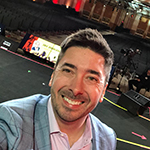 Jabez LeBret is a seasoned marketer who sold his award-winning agency in 2018 to pursue making an impact in K12 education. He is a journalist for NBC and Forbes, has delivered over 1,200 keynote presentations, and has a focus on growing teams and building products that make a difference in the world.
Jabez LeBret is a seasoned marketer who sold his award-winning agency in 2018 to pursue making an impact in K12 education. He is a journalist for NBC and Forbes, has delivered over 1,200 keynote presentations, and has a focus on growing teams and building products that make a difference in the world.







Leave a Reply